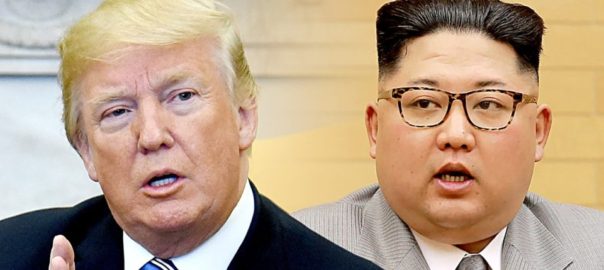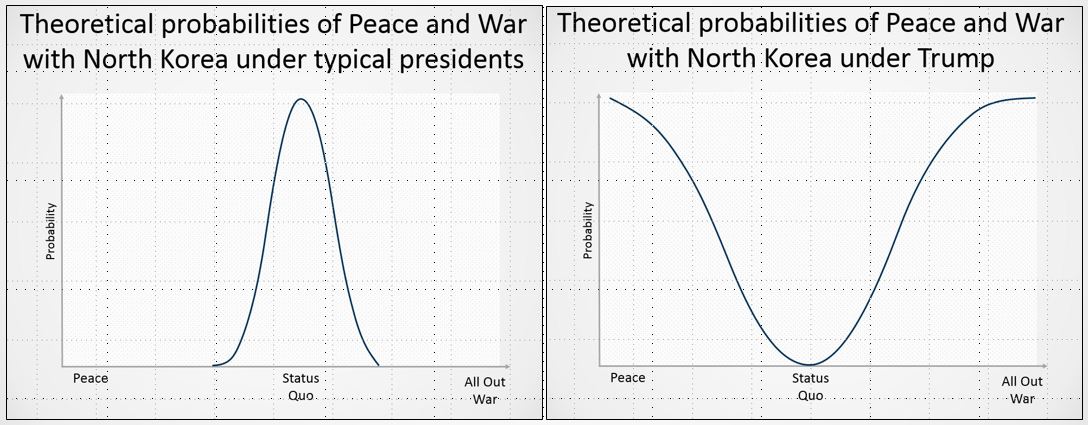By Kent R. Kroeger (Source: NuQum.com, March 9, 2018)
You are forgiven if you are feeling a little confused about President Donald Trump’s accepting an invitation for direct talks with North Korean leader Kim Jong Un sometime in the next two months.
On one side, pundits are effusive about this breakthrough.
“Donald Trump’s acceptance of Kim Jong-un’s invitation to meet is a master stroke. It’s exactly the kind of thing Ronald Reagan liked to do,” writes Jacob Heilbrunn for The Spectator. “Reagan announced his pursuit of a missile defense system in March 1983 on national television without alerting his advisers beforehand. Liberals went crazy. Then he decided to end the Cold War by reaching out to Mikhail Gorbachev. Conservatives went bonkers. Reagan, we were told, had become a useful idiot. Today he is hailed as a visionary by all and sundry.”
I don’t quite remember it that way, but I will defer to others on what exactly brought down the Soviet Union.
Heilbrunn’s drawing the parallel between Trump and Reagan is still apt. “All along Trump, like Reagan, has been dismissed as a buffoon by the regnant foreign policy establishment. He now wants to show that his much vaunted dealmaking prowess is for real. That he, and he alone, can solve the conundrum that has vexed his predecessors, dating back to Harry Truman.”
In contrast, there are foreign policy experts today that are more afraid than ever after the South Korea’s announcement of the upcoming talks:
“If…Trump actually succeeds in beginning the denuclearization of North Korea, he will be far worthier of the Nobel Peace Prize than Barack Obama ever was,” says Naval War College professor Tom Nichols. “The chances of this are roughly zero, but it’s not impossible. More likely is that this will all end in diplomatic disaster.”
“The White House is about to walk right into a trap the North Koreans have been laying for American presidents since the 1990s. A one-on-one summit between a U.S. president and one of the world’s weirdest and most irresponsible leaders would be a huge reward for a regime that has long chided other rogues and dictators for their weakness in dealing with the United States.”
Nichols points out that Libya’s Moammar Gadhafi’s decision to denuclearize his country followed by his unceremonious torture and death has decreased the chances any rogue nuclear power — like North Korea — will ever give up their nukes. We can thank Barack Obama and Hillary Clinton for that epic foreign policy disaster and its only the ineptness of Obama’s predecessor, George W. Bush, that Obama doesn’t go down in history as the worst foreign policy president since Jimmy Carter.
Nonetheless, Nichols believes in the value of experts and when it comes to diplomacy. “A summit should be a reward for months, even years, of careful work and actual progress. Meetings at lower levels should progress to more senior principals, and then to the heads of state.”
So if you are willing to prolong low-level diplomacy long enough so North Korea will have time to finish work on miniaturizing its nuclear arsenal and putting them on reliable ICBMs, Nichols is your guy.
Many of us who have lived through eight presidencies since the taking of the U.S.S. Pueblo by the North Koreans in 1968 are beginning to think slow boat diplomacy is a trip to a nuclear North Korea with ICBMs.
That is why Trump offers some sense of relief from the status quo-preserving diplomatic strategies of the past. Of course, it brings risks…big risks…such as, an all-out land war on the Korean peninsula.
That is bad option, even if you believe, as some military analysts do, that the U.S. military is more than capable of neutralizing the North Korean military in a short period of time, especially if North Korea uses its numerous artillery batteries to shell Seoul, South Korea to the neglect its border defenses.
“An all-out bombardment of the South Korean capital might very well leave Pyongyang without the ability to actually capture it, while at the same time ensuring a U.S./South Korean counteroffensive that would spell the end of the regime of Kim Jong-un,” writes Kyle Mizokami, a defense and national security writer based in San Francisco. “Even if a million civilians were killed in Seoul it would ensure Kim’s untimely demise, and from his perspective that is still almost certainly a very bad trade.”
It is acceptable to believe a nuclear North Korea with ICBMs is the better option.
Has the Chance of War on the Korean Peninsula Gone Up or Down?
As diplomacy experts and scholars debate over whether Trump has made a brilliant strategic move or an epic blunder, it is possible both views are accurate.
If you see presidents as having different risk acceptance levels with respect to war with North Korea, you can begin to visualize how Trump is so dramatically different from his predecessors.
The graphic below shows a theoretical depiction of war/peace probabilities from Harry Truman to Donald Trump. The graph on the left shows all previous presidents before Trump, and the graph on the right shows the probabilities of peace and war under Trump.
Its an oversimplification, of course, but the chances under previous presidents of peace or war with North Korea was essentially zero, as they were all dedicated to preserving the status quo. And for good reason. Most presidencies had bigger foreign policy problems than North Korea. LBJ and Nixon had Vietnam. Carter had Iran. Reagan had the Cold War to win. And George W. Bush and Obama had Middle East conflagrations to worry about.
Trump does not operate like that. The Middle East is no less problematic and new concerns arise every day now in Africa, yet Trump has a different view of risk. Maybe because war with North Korea sounds better than being interviewed by Robert Mueller? Who knows. What we seem to see with Trump is a deep dedication to the high risk-high reward strategy of diplomacy.
The office of the presidency generally discourages that strategic approach to problems; but this president has a unique set of pressures on him right now that have may helped prompt this dramatic diplomatic move.
The result is, we have a risk-accepting president that’s has given us an inverted probability distribution for war and peace in North Korea. And it is both exciting and frightening. Before this presidential term ends, we may well see either the Asian land war we all dread or the nuclear-free Korean peninsula we all pray for. What isn’t going to stand under our current president is the status quo. Trump blows up status quos the way Stephen Curry blows up perimeter defenses in the NBA. You can try to stop them, but they find a way.
And Trump has found a way with respect to North Korea. Regardless of political party, we should all wish him luck accompanied with a sudden bout of good judgment.
– K.R.K.
Added note: We should never discount the diplomatic skills of South Korean President Moon Jae-in, who is playing a pivotal role in these direct talks. Even as his popularity has lagged, Moon is proving to be more forward-leaning than many observers previously thought possible. Some analysts go as far to say Moon has engineered this whole breakthrough, dragging Kim Jong Un and Donald Trump with him.
{Send comments to: kkroeger@nuqum.com}
About the author: Kent Kroeger is a writer and statistical consultant with over 30 -years experience measuring and analyzing public opinion for public and private sector clients. He also spent ten years working for the U.S. Department of Defense’s Office of the Under Secretary of Defense for Personnel and Readiness and the Defense Intelligence Agency. He holds a B.S. degree in Journalism/Political Science from The University of Iowa, and an M.A. in Quantitative Methods from Columbia University (New York, NY). He lives in Ewing, New Jersey with his wife and son.

